- Home
- David Gemmell
Lion of Macedon Page 31
Lion of Macedon Read online
Page 31
With the enemy left locking shields and preparing to withstand the charge, Parmenion dragged on the left-hand rein, turning the stallion. Behind him the Theban cavalry also swerved, angling now towards the Spartan horsemen waiting at the centre of the line. Parmenion dipped the point of his lance and located his target, an officer in a long red cloak sitting upon a grey horse.
Too late the Spartan cavalry realized they were to bear the brunt of the first charge. Their officers yelled orders and tried to counter-charge, but the Thebans were upon them -screaming battle-cries, lances smashing men from their mounts. Parmenion’s spear glanced from the officer’s breastplate to plunge into his jaw and on through his brain. The man was lifted from his horse’s back, the weight of his dead body snapping the spear-shaft. Parmenion threw the broken weapon aside and drew the Sword of Leonidas.
All was milling chaos now, the Spartan cavalry forced back into the ranks of archers, slingers and javeliners. Unarmoured men fell beneath the hooves of panicked mounts and the enemy centre fell back in confusion.
A cavalryman slashed his sabre towards Parmenion’s head. Parmenion swayed away from the cut and plunged his own sword into the man’s neck.
An enormous dust-cloud obscured the front of the battle-lines now, and the air was thick and choking.
At the rear of the Spartan ranks on the right, Leonidas watched the attacking cavalry swerve and strike the centre. At first he was unconcerned, for the javeliners and archers were hardly significant; as always, the battle would be won by the Spartan phalanx. But something stirred deep in his memory, a cold, whispering thought which he could not quite grasp. In some strange way, he felt as if he had fought in this battle before, the enemy cavalry striking the centre. He swung his gaze to the front, and the swirling dust-cloud.
And remembered....
At that moment the Battle King Cleombrotus saw moving shapes within the dust, and realized that the Thebans were advancing upon him. He was exultant. He had expected the Boeotians to fortify the ridge and dare him to attack them, but for them to have the temerity to advance upon him was a gift he had not anticipated.
‘Rear four ranks right spear, right flank!’ he bellowed. The warriors, Leonidas among them, moved smoothly to the right, thinning the Spartan line to twelve deep and preparing to encircle the advancing enemy.
In a moment of icy terror Leonidas saw again the sand-pit at the home of Xenophon, the massed ranks of the enemy smashing the thinned Spartan line. ‘No!’ he screamed. ‘Sire!’ But his voice was lost as the Theban battle-cry went up, the sound like rolling thunder.
Inside the dust-cloud Pelopidas and the Sacred Band ran in front of the advancing Thebans, taking up a position at the head of the charge. ‘Death to the Spartans!’ shouted Pelopidas.
‘Death! Death! Death!’ roared the army, and they began to run.
Eighty shields across and fifty ranks deep, the Thebans smote the Spartan front line like an axe-blade against timber. The first two Spartan ranks buckled and fell beneath the stabbing swords, the phalanx sliced open by the weight of the charge.
The Spartans bravely tried to re-form, but no army twelve deep - no matter how courageous - could hope to contain an enemy with fifty concentrated ranks. Unable to lock shields, Spartan warriors were cut down where they stood.
At the head of the charge Pelopidas powered into the Spartan ranks, Callines beside him. A sword lanced towards Pelopidas’ head but Callines blocked it with his shield, stabbing his own sword deep into the Spartan’s groin. The phalanx moved on, slowing now but still advancing. Pelopidas was stabbing and hacking, oblivious to the many small cuts which bled freely on his arms and legs.
Behind him Epaminondas - at the centre of the phalanx, and not yet brought into the righting - peered through the dust, locating the Spartan King, Cleombrotus, who was fighting alongside his bodyguard a little to the right of the main advance.
‘Pelopidas!’ shouted the Theban general. ‘To your right! Your right!’
Pelopidas heard him, even through his bloodlust, and glanced round. He saw Cleombrotus and began to fight his way towards the Spartan King. Callines moved alongside him, the two men protecting one another and fighting as a team. Behind them the Sacred Band also altered the line of advance, homing in on the Spartan Battle King.
On the right Leonidas forced himself to the front of the two Spartan ranks ordered out to encircle the Thebans. Seeing the enemy closing on Cleombrotus, he ordered the men to close ranks. ‘The King! The King!’ he bellowed. The Spartans surged forward, desperately trying to reach the beleaguered monarch. ‘Fall back, sire! Fall back!’ yelled Leonidas.
Cleombrotus, realizing the danger, could not bring himself to retreat in the face of Thebans. ‘Stand firm,’ he told his bodyguard. ‘They will break upon us like the sea against stone.’
Parmenion and the cavalry had pushed deep into the enemy centre, the lightly-armoured archers fleeing before them. The Spartan cavalry had been routed. Parmenion swung left to see the Theban battle-line slowing as it sought to turn and crush Cleombrotus. His eyes flickered to the Spartan right, where he saw Leonidas had gathered two ranks to him and was forcing a path to save his King.
‘Thebans to me!’ shouted Parmenion. There were only fifty riders within hearing distance - the others were chasing down the fleeing archers - but the men galloped to him. ‘Follow me!’ Parmenion cried, kicking his heels to the stallion and charging the Spartan line.
The Spartans had tried to lock shields against the Theban phalanx, but they were more open on their left and the attacking horsemen clove through the ranks.
The move surprised the Spartans, who tried to turn and defend themselves. But this only weakened the front of the line, allowing Pelopidas and the Sacred Band to hammer through.
Cleombrotus cursed. His sword stabbed out, cleaving through the teeth of an advancing man and piercing him to the brain. Another Theban, then another, fell to the Battle King.
A scream came from beside him and he twisted in time to see his lover and companion, Hermias, fall - his throat slashed open. A dark-bearded warrior with a death’s-head grin leapt at him. Cleombrotus parried a thrust, then a second. But Pelopidas crashed his shield against the King, forcing him back, then dropped to his knees to ram his blade through Cleombrotus’ groin. Still the King tried to fight, but his lifeblood drained away - and with it his strength. His shield arm dropped and the Theban’s sword smashed his jaw to shards.
As the King fell, the Spartan centre buckled. Leonidas and his men finally forced their way to the front, gathering up the dead King and fighting a rearguard action back towards the defensive line of their night camp.
At last the battle petered out. Isolated groups of Spartan warriors were surrounded and destroyed, but Leonidas gathered the remnants into a strong defensive position on a nearby ridge. The Spartan allies, seeing the fall of Cleombrotus, fled the field without a fight.
The Thebans gathered around Pelopidas and Epami-nondas, hoisting them to their shoulders and carrying them around the battlefield, their cheers echoing to the Spartan lines.
Parmenion, his horse dead, walked slowly over the battlefield, looking down at the twisted corpses. More than 1,000 Spartiates had died for the loss of 200 Thebans, but at that moment these figures meant nothing to him. He was dazed and emotionless. He had seen the Battle King fall to Pelopidas, but worse he had watched the Theban kill Hermias moments before. Parmenion knelt by the body, looking down at the face of a man and seeing the face of the boy who had befriended him.
He remembered the night when they had sat by the statue of Athena of the Road, when he had learned there would be no victory celebration after winning the Games.
‘I will make them all pay!’ he had promised. And Hermias had touched his arm.
‘Do not hate me too, Savra!’
‘Hate you, my friend?’ he had answered’. ‘How could I ever hate you? You have been a brother to me, and I will never forget that. Never! Brothers we have been, brothers we s
hall be, all the days of our lives. I promise you.’
He closed the dead eyes and rose to his feet. The surgeons were coming on to the battlefield now, moving to the wounded Thebans. Most of these men would die, Parmenion knew, for physicians with the skills of Argonas or Dronicus were rare. He gazed around him. There to the left lay Callines, the man who had admitted to being a poor swordsman. Further away was the body of Norac the Smith. Later he would hear of the other dead, like Calepios the orator and Melon the statesman. He looked down at his hands, which were covered in blood, drying now to a dull, scabby brown.
Crows were already circling above the plain.
He recalled the General’s Games, the cleanly-carved soldiers in the box of sand. No blood there, no stench of open bowels. Just a child’s game, fought without pain in the sunshine of another age.
‘I will repay them all,’ he had promised Hermias.
And he had. But at what price? Hermias was dead, as Derae and now Thetis were dead.
Sparta was finished, her invincibility gone. Now other cities dominated by Sparta would rise against her and she would fade away, her power a memory. Not immediately, he knew; there would be other Spartan victories. But never again would they rise to rule Greece.
‘I am the Death of Nations,’ he whispered.
‘Or the saviour of them?’ suggested Epaminondas.
Parmenion turned. ‘I did not hear you. You won, my friend. You won a famous victory. I hope Thebes proves a better ruler than Sparta.’
‘We seek to rule no one,’ said Epaminondas.
Parmenion rubbed at his tired eyes. ‘It will be thrust upon you, general. In order to be safe, you will carry the battle to Sparta and humble her. Then the Athenians and their allies will fear you, and will come against you. Rule or die, they are the choices you have.’
‘Do not be so glum, Parmenion. This is a new age, when we do not have to repeat the follies of the past. The Spartans will send an ambassador to ask permission to remove their dead; you will receive him.’
Parmenion shook his head. ‘Listen to me,’ said Epaminondas softly. ‘You have carried your hate for too many years. With this victory you can bury that hate for ever. You can be free. Do this for me.’
‘As you will,’ agreed the Spartan, his mind empty, his emotions drained. All his adult life he had dreamed of this moment, but now it was here he felt dead inside. Thetis had asked him what he would do once his vengeance was complete. He had no answer then, he could find none now. He gazed around at the silent corpses. Where, he wondered, was the joy of victory? Where was the satisfaction?
Three hours later, with dusk approaching, a Spartan rider cantered into the Theban camp.
Leonidas was led to a tent where Parmenion waited.
‘I knew it was your plan,’ said Leonidas. ‘How does it feel to have defeated the army of your homeland?’
‘You are here to concede defeat,’ Parmenion told him coldly, ‘and to ask permission to remove your dead. I give you that permission.’
. ‘You do not wish to gloat?’ Leonidas asked. ‘I am here, Parmenion. Mock me if you will. Tell me how you promised this. Tell me how fine it makes you feel.’
‘I cannot. And if I could, I would not. You almost held us. With a mere twelve ranks you almost turned the battle.
Had Cleombrotus fallen back to link with you, you could have held. There has never been an army so disciplined, or so brave, as that of Sparta. I salute your dead, as I salute the memory of all that was great in Spartan history.’ He poured two goblets of wine, passing one to the stunned Spartan. ‘A long time ago,’ he continued, ‘your sister wanted to buy you a gift. I would not sell it. But now is the time for it to be returned.’ Unbuckling his sword-belt he passed the legendary blade to Leonidas, who stared down at it disbelievingly.
Then Leonidas sat on the pallet bed and drained his wine at a single swallow. ‘What is it that we do to one another?’ asked the Spartan. ‘You won the Games fairly. I said it then, and I will say it now. I never asked those boys to beat you. Indeed, I did not know it was happening. And I wish that you had married Derae. But events propel us, Par-menion. Our souls are but leaves in a storm, and only the gods know where we will come to rest. We are enemies, you and I; the Fates have decreed that. But you are a man of courage - and you fight like a Spartan. I salute your victory.’ He stood and returned the empty goblet. ‘What will you do now?’
‘I shall leaves Thebes and travel. I will see the world, Leonidas.’
‘As a soldier?’
‘It is all that I have - all that I know.’
‘Farewell then, Parmenion. If we meet again, I will do my utmost to kill you.’
‘I know. May the gods walk with you, Leonidas.’
‘And with you... strategos.’
Tamis was confused as her spirit eyes watched Parmenion return the legendary sword. That was not how it was meant to happen. The hatred between the two men should have been strengthened — all the futures showed it so. For a moment only her confusion threatened to become panic, but she brushed her doubts aside. What did it matter? Three of the Chosen were dead. Only one remained.
And with him there was time. All kinds of accidents could befall a fourteen-year-old hostage living in Thebes.
Surely he would prove less of a threat than Cleombrotus, the mighty Battle King of the Spartans? The boy was not even from a civilized city, born and bred as he was in the forests and hills of Macedonia.
He would probably be murdered like his father. Such was the fate of those close to the throne in backward nations, the King eliminating all possible rivals.
No, Tamis decided, there was nothing to fear from Philip of Macedon.
Book Three
Thebes: Autumn, 371 BC
Philip of Macedon watched the cheering crowds as the flower-garlanded heroes of Leuctra marched through the streets. It had been an unbelievable victory. Never before had the Spartan army been defeated in such a manner. It was both impossible and somehow wonderful - even to a Macedonian. Philip could understand the irrepressible joy of the multitudes, for they were celebrating an event few of them had believed credible - the Spartans crushed by a smaller force.
There was music from the streets, and Philip longed to leave the silent house and join them, to dance and forget his own private torments.
But Pammenes had told him to wait for a visitor.
The Theban had been unable to meet his eyes, shifting nervously as he spoke. Fear and anger had flared in Philip at that moment, but he masked both emotions until Pammenes had left. Moving back from the window, Philip poured himself a goblet of water and considered the problem.
He had heard nothing from his brother Perdiccas for two months, so the present fear was hardly new. Perdiccas was three years older than Philip, and therefore closer to the throne. He would be the first to die. So Philip wrote to him constantly, and to his cousins and nieces - asking about the royal horse herds, enquiring after the health of relatives. When the letters from Perdiccas stopped Philip’s sleepless nights had begun, as he waited for the day of the assassin. Now it was here. They would not kill him while he was in Thebes, he reassured himself, for that would be bad manners. Idly he touched the dagger at his belt. Little use this would be. Though strong, Philip was a mere 14 years old and no match for any but the clumsiest adult warrior. And they would send no one clumsy.
‘What shall I do, Crosi?’ he asked the ghost of the old man. There was no answer, but whispering the name aloud helped ease his tension. He remembered the night of the knives, the old man moving silently into his bedroom with a short sword in his hand. Philip had been ten then. Crosi had led him to a shadowed corner of the room, ordering him to hide behind a couch.
‘What is happening?’ Philip asked.
‘Blood and death,’ replied the old man. ‘But I will protect you, boy. Have no fear.’
Philip had believed him. At ten a child has faith in the fully-grown. Crosi had sat on the couch, sword in hand, and they had wa
ited until the dawn. No one came.
Philip had crouched in the cold, wrapped in a blanket, too frightened to ask the nature of the peril. As the sun cleared the distant Crousian mountains, Crosi had relaxed.
‘Come out, boy,’ he said, taking Philip’s hand and drawing him forth. He put his arms around the prince and hugged him briefly. ‘Last night,’ he said, ‘your father died. Ptolemaos now rules in Macedonia.’
‘But... Father is so strong! He can’t be dead!’
‘No man can withstand a dagger in the heart, Philip.’
‘Who did it? And why?’
‘These are questions I will not answer, boy. But, for now -I hope - your danger is past.’
‘Uncle Ptolemaos will look after me,’ said Philip, but even at ten he saw the angry look in Crosi’s eyes just before the old man stood and turned away. He did not fully understand it then, but now he remembered it clearly. Now he knew the answers, though no one had ever voiced them.
Ptolemaos had killed King Amyntas. Uncle Ptolemaos, who within three months had married Philip’s mother, Eurydice, and buried her a year later beside her murdered husband. Philip’s parents had been cold towards their youngest son, but even so the boy had loved them, worshipping his father and doing all in his power to please him.
The following year had seen Philip’s boyhood washed away in the acid of intrigue and sudden death. Philip’s eldest brother, Alexander, had been found murdered at his summer home in Aigai, killed by unknown assailants. Three adult cousins died mysteriously.
Then had come the Theban demand for hostages, following a short, bitter month of conflict between the Macedonian army and a force led by Pelopidas, the great Theban warrior. The Macedonians had been crushed. Ptolemaos sent twelve hostages - including Philip - to Thebes, and for the first time in months the young prince felt safe.
They had not let Crosi come with him, and the old man had died of a fever last spring. Philip still mourned him, and prayed that his ghost would be allowed to walk alongside him until his own assassination. Then, maybe, together they could journey into the Lands of the Dead.

 Bloodstone
Bloodstone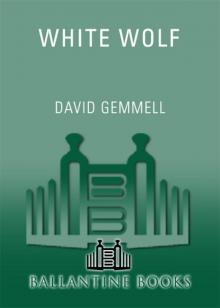 White Wolf
White Wolf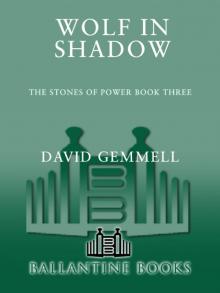 Wolf in Shadow
Wolf in Shadow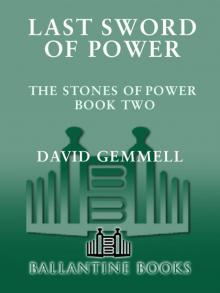 Last Sword of Power
Last Sword of Power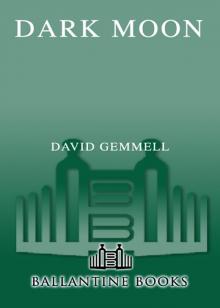 Dark Moon
Dark Moon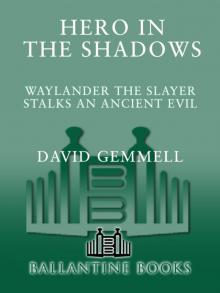 Hero in the Shadows
Hero in the Shadows Gemmell, David - Drenai 09 - Hero In The Shadows
Gemmell, David - Drenai 09 - Hero In The Shadows Waylander
Waylander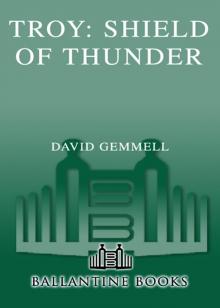 Shield of Thunder
Shield of Thunder Stormrider Stormrider
Stormrider Stormrider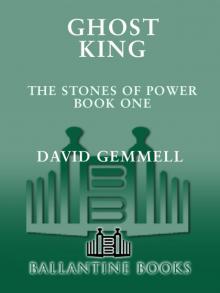 Ghost King
Ghost King Legend
Legend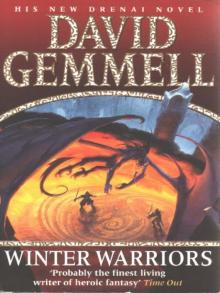 Winter Warriors
Winter Warriors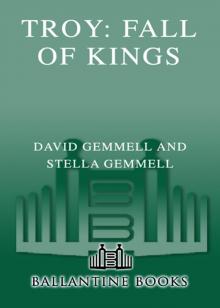 Fall of Kings
Fall of Kings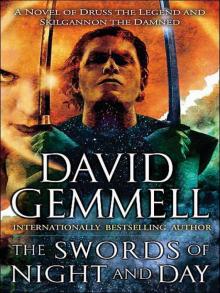 The Swords of Night and Day
The Swords of Night and Day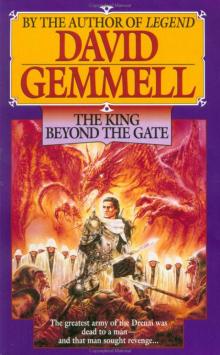 The King Beyond the Gate
The King Beyond the Gate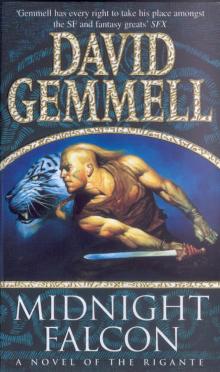 Midnight Falcon
Midnight Falcon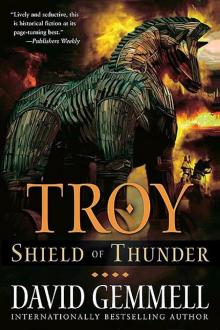 02 - Shield of Thunder
02 - Shield of Thunder In the Realm of the Wolf
In the Realm of the Wolf Ravenheart
Ravenheart The First Chronicles of Druss the Legend
The First Chronicles of Druss the Legend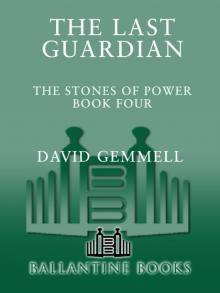 Last Guardian
Last Guardian Stormrider
Stormrider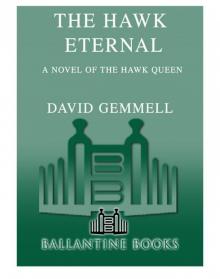 The Hawk Eternal
The Hawk Eternal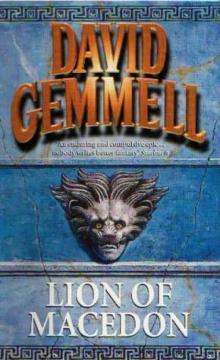 Lion of Macedon
Lion of Macedon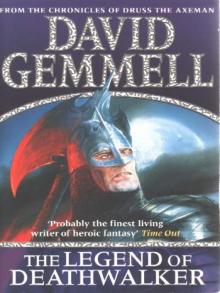 The Legend of Deathwalker
The Legend of Deathwalker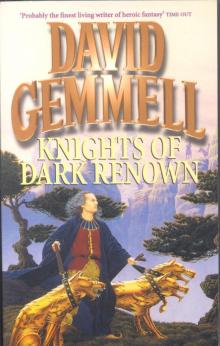 Knights of Dark Renown
Knights of Dark Renown Echoes of the Great Song
Echoes of the Great Song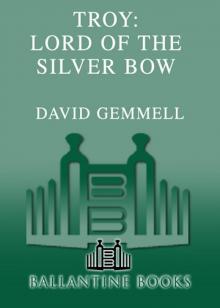 Lord of the Silver Bow
Lord of the Silver Bow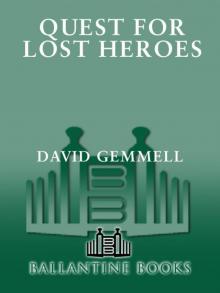 Quest for Lost Heroes
Quest for Lost Heroes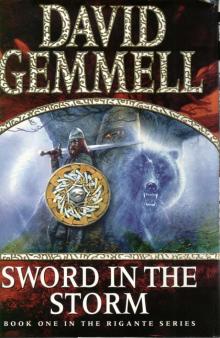 Sword in the Storm
Sword in the Storm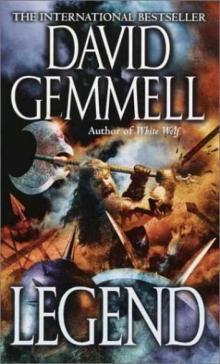 Drenai Saga 01 - Legend
Drenai Saga 01 - Legend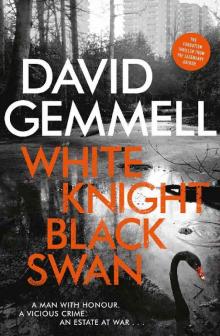 White Knight/Black Swan
White Knight/Black Swan![[Troy 02] - Shield of Thunder Read online](http://i1.bookreadfree.com/i/03/19/troy_02_-_shield_of_thunder_preview.jpg) [Troy 02] - Shield of Thunder
[Troy 02] - Shield of Thunder Lord of the Silver Bow t-1
Lord of the Silver Bow t-1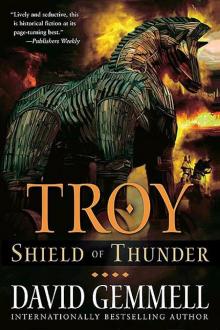 Shield of Thunder t-2
Shield of Thunder t-2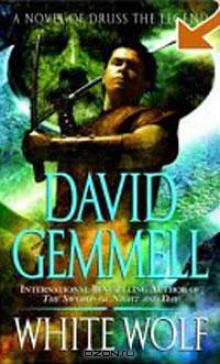 White Wolf: A Novel of Druss the Legend dt-10
White Wolf: A Novel of Druss the Legend dt-10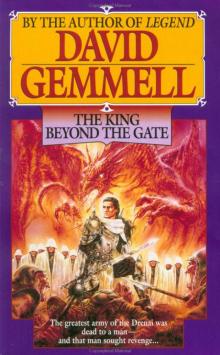 Drenai Saga 02 - The King Beyond the Gate
Drenai Saga 02 - The King Beyond the Gate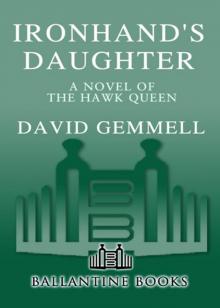 Ironhand's Daughter
Ironhand's Daughter Gemmell, David - Drenai 06 - The First Chronicles of Druss the Legend
Gemmell, David - Drenai 06 - The First Chronicles of Druss the Legend The Last Guardian
The Last Guardian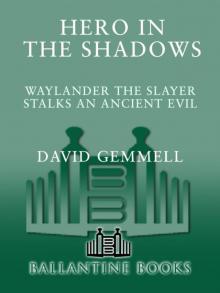 Hero in the Shadows: A Waylander the Slayer Novel
Hero in the Shadows: A Waylander the Slayer Novel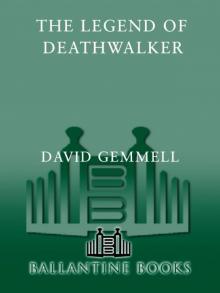 The Legend of the Deathwalker
The Legend of the Deathwalker